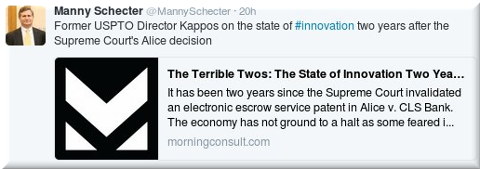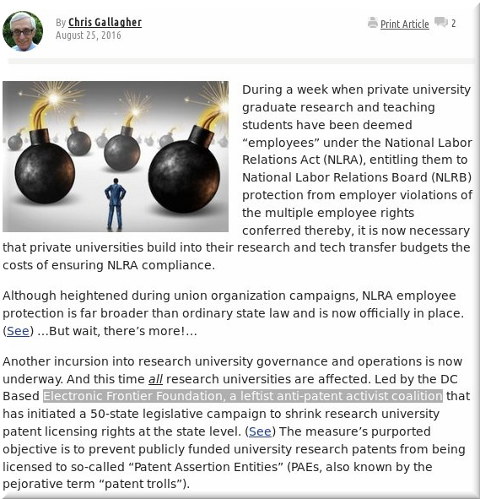08.26.16
Posted in America, IBM, Patents at 2:54 pm by Dr. Roy Schestowitz
How shallow, spotted just hours after publication by Kappos

Manny Schecter works for IBM, the former employer of Kappos
Summary: Responses to the latest call against Alice (eliminator of many software patents), courtesy of the man from IBM (still paid by IBM) who was responsible for the policy that blindly approved a lot of software patents in the US
Our latest article about David Kappos (who has in essence been helping Microsoft's extortion of Linux using low-quality patents in large numbers) was well received by quite a few people. They know a lot better now what Kappos stands for and who pays him. Our many articles on the subject contributed to that. Interest groups and lobbyists are among the things we have been exposing for nearly a decade. Once exposed, they are a lot less capable of operating. Sometimes they need to rename.
As Henrion put it/told Manny Schecter (IBM), “he [Kappos] is a Microsoft/Apple spokesman.” He is also a former IBM employee who is now being paid by IBM for his lobbying.
This article from Kappos led to an article by Mike Masnick (via Professor James Bessen) shortly after we had mentioned it. Masnick said that “of course, if you’re former US Patent and Trademark Office boss David Kappos — who presided over a massive increase in patenting, which the Government Accountability Office recently noted was mainly due to basically no quality standards being used — this is a bad thing. Perhaps he takes it personally that the current patent situation really puts an exclamation point on the fact that he helped usher in hundreds of thousands of anti-innovation weapons that could be used to shake down actual innovators.”
Like the Battistelli-led EPO right now? AntiSoftwarePat highlights the part of the above article which says Kappos “presided over a massive increase in patenting… mainly due to basically no quality standards being used” (i.e. rubberstamping, with approval rates soaring). █
Permalink
 Send this to a friend
Send this to a friend
Posted in Deception, EFF, Patents at 2:28 pm by Dr. Roy Schestowitz
Black or white: either you’re a patent maximalist or you are “anti-patents” (or “anti-patent” as Watchtroll puts it, see below)

Summary: Like IAM, which tries to portray sceptics and critics of software patents as “anti-patents”, IP Watchdog (or Watchtroll as we call it) is ‘trolling’ the Electronic Frontier Foundation, simply because it expressed an opinion that patent maximalists cannot tolerate
Watchtroll’s site, being the usual loud-mouthed proponent of software patents (sometimes even very rude), responded to a topic on which we commented this morning. Daniel Nazer (EFF) noticed that this “New IP Watchdog post [is] slamming “DC Based Electronic Frontier Foundation, a leftist anti-patent activist coalition”” (it’s not anti-patent, it is pro-patent quality, as are we).
Here is the relevant passage from the post: “Another incursion into research university governance and operations is now underway. And this time all research universities are affected. Led by the DC Based Electronic Frontier Foundation, a leftist anti-patent activist coalition that has initiated a 50-state legislative campaign to shrink research university patent licensing rights at the state level. (See) The measure’s purported objective is to prevent publicly funded university research patents from being licensed to so-called “Patent Assertion Entities” (PAEs, also known by the pejorative term “patent trolls”).”
Like IAM's editor in chief, they are also in denial about the trolls problem, just like people who are in denial about climate change (because this reality, once realised by the public, is a threat to one’s business).
The OSI took note and wrote about my article via Former OSI Dir. Jim Jagielski who wrote: “Shows the danger of s/w patents… is it time to finally squash them once and for all?”
Carlo Piana, a famous lawyer for Samba and generally a very nice intellectual (against software patents) wrote on Friday: Has anybody, ever, read a #patent on software without thinking “WTF”? Honestly. And now I have read like 100 of them. And I’m no developer.”
Benjamin Henrion (FFII) responded: “the state urgently needs to intervene between me and my keyboard to save innovation!”
The matter of fact here is clear; anyone with a keyboard and some rudimentary coding skills is affected by software patents and the population in general suffers from slowed innovation and artificially increased prices (often due to lawyers’ fees and patent trolls if not billionaire patent bullies such as Microsoft and Apple). We wrote about it this morning. █
Permalink
 Send this to a friend
Send this to a friend
Posted in America, Apple, Courtroom, Europe, Microsoft, Patents, Samsung at 7:55 am by Dr. Roy Schestowitz
Quality of patents causes markets to prosper or contrariwise perish

Giving aggressors like Microsoft sacks of patents to breed Mafia-like behaviour, not healthy competition
Summary: Revisiting the EPO’s vision of poor patent examination and the effect of discriminatory granting practices, favouring patent bullies such as Microsoft (which actively attacks Linux using low-quality and usually pure software patents)
“A skilled patent attorney working with a qualified searcher could cobble together a colorable obviousness argument against the vast majority of issued patent claims,” says a new article from Patently-O. Not to mention “abstract” criteria, prior art and so on. “Part of the difficulty for patentees,” continues the article, “stem from the the billions of prior art references available via increasingly effective search tools. Even when an invention results from a ‘flash of genius,’ patent law typically back-fills extensive knowledge for the obviousness analysis – even when that knowledge was not actually available at the time of the invention. The larger difficulty though is likely the large number of hard-to-pin-down facts such as the motivations, common sense, and level of creativity of a person having ordinary skill in the art.”
“In the case of large companies like Microsoft, mountains of patents (granted in bulk by the EPO]) can be used to compel companies to pay up without even a trial.”If the EPO replaces examiners with algorithms, things will exacerbate further and patents get granted incorrectly, leading to an ocean of frivolous lawsuits. In the case of large companies like Microsoft, mountains of patents (granted in bulk by the EPO) can be used to compel companies to pay up without even a trial. Recall the Microsoft v TomTom case. Picking on small companies is Microsoft’s thing; it doesn’t sue Google.
The above reminds us of the danger of poor patent quality as well as streamlining grants, which is what Battistelli’s EPO has in effect done for Microsoft (and evidence we showed for that led to legal threats from the EPO). They — like the USPTO — in effect facilitate patent racketeering by Microsoft.
“They — like the USPTO — in effect facilitate patent racketeering by Microsoft.”Watch this new article titled “Primetime: Microsoft’s Android Cross Patent Dealings”. That’s misleading because it's not cross-licensing, it's a patent settlement (in bundling form) and it’s essentially a patent shakedown without even a trial and without an opportunity to properly assess the quality (and thus in/validity) of patents. The article says that “to press on this advantage, Microsoft does need to sign into more cross licensing or similar patent deals with manufacturers. Given Microsoft’s patent portfolio and how useful this will be to those manufacturers wishing to break into the North American market, such as Xiaomi, we may be seeing more of these arrangements in the coming months. The alternative might be Microsoft suing any manufacturer that tries to sell devices into a patent-friendly market.”
But again, these are not cross-licensing deals, these are patent shakedowns. One might even call this extortion or racketeering, even though Microsoft is too well-connected to face court charges brought forth by the government.
It is worth noting that many of Microsoft’s patents — those which it uses to shake down Android players (OEMs) — are not even valid anymore (if properly scrutinised), but there are so many of them that it would cost a fortune to demonstrate it to the court. It’s a numbers game, quantity rather than quality. It’s cheaper to just settle and let Microsoft continue to wield software patents like a weapon, even post-Alice. PTAB cannot take a request to review hundreds of patents from just one single company because it’s already overburdened by a growing number of reviews (IPRs).
Speaking of patent aggressors, there is this new software patent from Facebook (the usual, see our Facebook wiki page). These are oftentimes surveillance patents, but this time is’s about languages, at a time of increased competition with Google. Facebook's growing stockpile of patents is a real problem (Facebook has a history of going aggressive with them) and The Next Web says that “the US patent office issued 6,789 patents. Each patent adds a little something new to the human knowledge base. As we cannot list all six thousand, the PatentYogi team has selected the five most interesting patents.” How many of these are software patents that oughtn’t have been granted? How many of these will be toothless some time in the near future?
Patently-O says “The number of pending Ex Parte appeals continue to drop. Great work PTO.” There are other statistics of interest, based on PDFs from the USPTO (like this one). Patently-O claims they suggest that: “Design patent applications expected to reach 40,000 for FY2016 – up from under 30,000 in FY2010. The PTO is working to improve design patent prosecution speed – current wait of more than a year for a first office action.”
Well, the Office may have granted 40,000 patents on designs, but once reassessed the Office may need to throw them all away, on a per-request basis (post-Apple v Samsung at SCOTUS). Granting again for the sake of granting? Until the next Alice happens?
Patent quality control is the principal pillar of true and potent patent offices, otherwise they would be just archives of untested claims (a registration/filing system). █
Permalink
 Send this to a friend
Send this to a friend
Posted in Europe, Patents at 6:59 am by Dr. Roy Schestowitz
In the pockets of the patent microcosm

Summary: Benjamin Henrion (FFII) on seeing the EPO alongside patent trolls and other nefarious actors, doing what they do best, which is undermining public interests and harming patent quality
“PUBLIC SERVANTS” has become misnomer for EPO officials. Consider the EPO‘s Francesco Zaccà, whom we first mentioned in this leak about "Closer Contact with Major Applicants" (with special ties to Qualcomm and Ericsson in his case). Benjamin Henrion drew attention to this recent talk, showing even the patent troll Sisvel at this recent event, which included Zaccà.
From the page in question: “The panel chaired by Francisco Mingorance, IP Europe, stressed the importance of innovation protection as a growth factor. Pasquale Marasco, head of ICT Innovation Pole at Torino Wireless Foundation, highlighted the SME’s stakes and concerns, as Matteo Sabattini, Sisvel CTO, reinforced the message detailing Sisvel’s example. Francesco Zaccà, Director in ICT of EPO, echoed the keynote address and said that «the main goal of the patent system is to protect innovation, to enable the innovation circle from protecting the invention, securing remuneration and re-investing in research. Yet, every challenge is a new opportunity for combining standards with open sources, and patents with protection». His opening statement «we are here to support innovation» fired up the crowd.”
“Francesco Zaccà, speaking for the EPO, is quoted or paraphrased as saying that every challenge is a new opportunity for combining standards with open sources, and patents with protection.”Francesco Zaccà, speaking for the EPO, is quoted or paraphrased as saying that every challenge is a new opportunity for combining standards with open sources, and patents with protection. What an odd thing to say. This sure sounds like the FRAND loophole for software patents in Europe. Not good…
Francisco Mingorance, now in IP Europe, is a former software patents lobbyist from the Business Software Alliance (BSA), a Microsoft front group which spent years lobbying for software patents in Europe (FRAND was one loophole they attempted to interject). Mingorance now chairs a panel with Zaccà in it. His employer, IP Europe, is a front for the patent microcosm and Henrion describes them, based on their words, as “Accelerating the entry into force of the Unified Patent Court (UPC Agreement): more trolling powers http://www.iptalks.eu/”
“They’re supposed to be focused on patent examination, not lobbying and lawmaking.”Some people still act as though the UPC will become a reality. It probably never will. It’s zombie legislation like ACTA, but the patent microcosm still wants us to believe there will be UPC after Brexit. It’s that old self-fulfilling prophecy method and they really ought to just give it all up. Found via this tweet was a Team UPC blog post the UPC “post-Brexit” (it would probably have to be rewritten and renamed to have any chance at all).
Thomas F. Cotter, a law professor from the US, more recently referred to a “paper in the June 2016 issue of GRUR Int (pp. 513-30) titled Schadensersatz und Einheitspatentsystem: Rechtliche Grundlagen und Systematik des Schadensersatzanspruchs im künftigen Einheitspatentsystem (“Damages and Unitary Patent System: Legal Principles and Schematic of Damages Claims in the Future Unitary Patent System”).”
According to him, this “article notes, among other things, that article 68(4) of the Agreement on a Unified Patent Court appears to permit a court to award the infringer’s profits without evidence that the infringer knew or should have known of the patent (in contrast to German law). Towards the end of the article, the author also questions whether the Agreement contemplates anything comparable to the German practice of permitting a court to award damages in its free discretion (nach freier Überzeugung) under article 287 of the German Civil Procedure Code (see my recent article on Patent Damages Heuristics at p.20 & n.76 for brief discussion). My one critique of the article is that it doesn’t take account of the change made in the 17th and 18th drafts of the UPC Rules of Procedure, which in a departure from the 16th draft have eliminated the provision (article 118(2)) that would have allowed the court to award damages in lieu of injunctive relief (see discussion on this blog here). Overall, though, a good read.”
“People who believe that the UPC will become a reality some very time soon are truly out of touch, much like Battistelli and his circle of ‘loyals’.”The patent microcosm (which dominates Team UPC) wants the UPC for more lawsuits, more/higher damages, and a generally litigious atmosphere that brings them more business. It’s truly a shame that EPO staff, including Zaccà’s colleagues, are openly promoting it at events (as Philpott did last year). What credibility will they have left? They’re supposed to be focused on patent examination, not lobbying and lawmaking.
Found via this tweet was yet more promotion of the UPC, courtesy of Team UPC again. “Unitary Patent reforms are welcome, even though patent litigation in Europe has worked quite well” says the headline and Francisco Moreno, a critic of the UPC, uses the hashtags #UPCbelievers and #PrayForTheUPC (sarcasm) in relation to what Tufty Sylvestris wrote about the above: “Another Remainer disappointed about the effect of #Brexit on the UPC, but still hopeful (or in denial).”
People who believe that the UPC will become a reality some very time soon are truly out of touch, much like Battistelli and his circle of ‘loyals’. Maybe they too should quit embarrassing themselves and work on fixing the EPO. Pushing towards software patents in Europe (directly or indirectly) is just about the dumbest thing they can do. █
Permalink
 Send this to a friend
Send this to a friend
Posted in America, Europe, Patents at 6:27 am by Dr. Roy Schestowitz

Summary: Tackling some of the commonly-spread myths about patents as “saving lives” and “promoting research” (in practice leading to the death of poor people and promoting trolls)
THE patent system exists for a reason, but nowadays that reason is no longer the original reason. “Page not found” says this link EPO‘s account regarding oppositions to particular patents, which is kind of poetic when one thinks about it. Battistelli’s EPO doesn’t want oppositions. Rubber-stamping is better for so-called ‘production’. That’s not what the patent system exists for.
Following its pattern of 'spamming' (not broadcasting to everyone on a per-subscription basis as in this new example), the EPO is pinging the University of Bonn with some template message like “Got any proposals for our Inventor Award 2017? Submit them here” (Battistelli’s lobbying event).
Why is the EPO bothering universities now? It has already sent dozens of such ‘spammy’ messages, but now it’s doing after universities.
“That’s not what the patent system exists for.”Mr. Nazer, writing about universities that pursue patents, correctly notes that many of these patents end up in the hands of patent trolls. Here is a portion of what he wrote for the EFF the other day:
EFF recently launched Reclaim Invention, a project to encourage universities to manage their patent portfolios in a way that maximizes the public benefit. Specifically, we’ve urged universities to sign a Public Interest Patent Pledge not to sell or exclusively license patents to patent assertion entities, also known as patent trolls. EFF is proud to partner with Creative Commons, Engine, Fight for the Future, Knowledge Ecology International, and Public Knowledge on this initiative.
As part of our project, we’ve also released draft state legislation that we hope state legislators can adapt to promote pro-innovation technology transfer at state universities. Our legislative language has two components. First, it requires university technology transfer offices to adopt a policy committing them to manage patent assets in the public interest.
If the public cares about innovation and good use of public money, then the public should prevent universities from filing for patents. Universities don’t need these, but friends of mine who work at the universities say that they are being pressured by administration staff to just amass patents, not just published academic papers. It’s not often that universities sue using patents because usually they do so indirectly or offload their patents to trolls.
“Patent lawyers want us to believe that effective and affordable medicine exists because of patents, but in reality it exists in spite of patents.”“75% of the 20 patent lawsuits filed yesterday were filed by patent trolls,” United for Patent Reform wrote the other day. “It’s time for Congress to take action to #fixpatents!”
The above seems to be a lot lower than the average. For technology patent lawsuits, it’s now estimated (based on a complete/exhaustive list) that just under 90% of the time these are filed by trolls. They dominate the system.
Research and development in the public sector need not rely on patents, no matter what nonsense the EPO spreads with stock photography and prose. Patent lawyers want us to believe that effective and affordable medicine exists because of patents, but in reality it exists in spite of patents. Cancer patients, as explained to the EPO, actually suffer from patents, but patent boosters are busy framing the USPTO as a friend of cancer research. To quote this new example from Professor Crouch: “The USPTO is playing an important role in the National Cancer Moonshot, a Presidential initiative we blogged about earlier this summer, to speed up cancer advances, make more therapies available to more patients, and improve the ability to prevent cancer and detect it at an early stage. Today, we are launching the USPTO Cancer Moonshot Challenge to enlist the public’s help to leverage our intellectual property data, often an early indicator of meaningful research and development (R&D), and combine it with other economic and funding data (ie. U.S. Securities and Exchange Commission filings, Food and Drug Administration reporting, National Science Foundation grants vs. philanthropic investments, venture capital funding, etc.). This comes on the heels of our Patents 4 Patients program, which was launched in July and aims to cut in half the time it takes to review patent applications in cancer therapy.”
Actually, a lot of cancer research money comes from the public (government grants, not just donations); afterwards there’s privateering with patents (monopoly on treatments and thus overpricing), so who gains and who dies?
EpiPen is under heavy fire this week for price hikes owing to Congressional nepotism, but Professor Crouch links to this horrible new article which glamourises patents (even those that kill poor people) as well as a famous patent troll. It’s sad to see that patent myths continue to thrive not just because of the patent industry but also the EPO and USPTO. They want us to believe that the more patents we have, the better. It’s usually better for patent offices, trolls, and few opportunists with crooked nepotism (see EpiPen’s example). █
Permalink
 Send this to a friend
Send this to a friend
Posted in IBM, Microsoft, Patents at 5:56 am by Dr. Roy Schestowitz
Microsoft, IBM and few other large companies pay former USPTO officials to promote software patents

Summary: The latest lobbying from David Kappos, who blatantly exploits his connections in patent circles to promote software patents and work towards their resurgence after Alice v CLS Bank
LAST NIGHT we wrote about the demise of software patents in the US. The USPTO, which David Kappos had turned into more of a rubber-stamping operation (because of the growing backlog), finally had to accept that many patents were erroneously granted (if not fraudulently granted to increase measurable figures).
“The FTC PAE report should be the final nail in the coffin for Software Patents,” AntiSoftwarePat wrote last night in response to my article. He or she has been saying this for quite a while. PAE is a type of patent troll, for those who don’t know.
“He doesn’t want people to know what he does for a living in his capacity as a de facto lobbyist.”Kappos deserves at least some of the blame for the terrible status quo. So many patents at the USPTO are junk and patent trolls needn’t even go to court and face the burden of proof; they just target small businesses in secret (divide and rule) to shake these down using bogus patents. Kappos is absolutely fine with that and we wrote a lot about this nefarious activity of his quite a lot this year. He doesn’t want people to know what he does for a living in his capacity as a de facto lobbyist. Instead, says his own description of himself: “Dave Kappos is a partner at Cravath, Swaine and Moore LLP and previously served as under secretary of commerce and director of the United States Patent and Trade Office.”
He does not disclose he works for a front group funded by monopolists which support software patents. Yesterday, published in the Morning Consult Web site was this Kappos piece protesting Alice v CLS Bank. He took wonderful news, namely the gradual end of software patents in the US, and called it “the terrible” (not for software developers but for parasites like him and his ilk).
Once again he pretends it’s a loss to software innovation and other such malarkey. He does not disclose who pays him to utter this nonsense. Here is the ending paragraph:
Rather than celebrate or mourn the anniversary of Alice, we should recognize that its overly broad application stifles software innovation in fields that require major, sustained investments to address humanity’s truly daunting challenges—across industries from life sciences to information technology to transportation and beyond. There is some room for cautious optimism—recent decisions from the federal circuit in Enfish, Bascom and Rapid Litigation Management have upheld quality patents challenged on eligibility grounds—but unless the courts continue to provide clearer guidance, a long heritage of American innovation leadership will be at risk. We should seek balance by applying Alice narrowly, “lest [Section 101′s exclusionary principle] swallow all of patent law”— and let the other parts of the law do their work.
“When legislation and/or caselaw is up for sale we all lose.”It’s clear that he is asking for loopholes so that software patents can still be granted and asserted (successfully) in courts. It’s not about “clarity” (we explained this spin of his before and also showed the so-called whitepaper he published last year to reveal his bias on this topic). Quick to promote this article was IBM’s Manny Schecter, who is funding him through IBM (Kappos used to work at IBM, which now just pays him through a front group). Congratulating one’s own lobbyist again? Does he not see ethical breach amid all that patent aggression by IBM? Microsoft is paying Kappos as well and it too is attacking even Android/Linux using patents, as recently as a few days ago.
What will it take for these companies to stop bribing former officials and hide behind them while they lobby for the resurrection of software patents? Who are those people kidding? Can one file a formal complaint for “revolving doors” kind of abuse here? We might try soon, perhaps once we identify the best authority/institution to address regarding the unprofessional (and likely unethical if not in breach of contract) practice. When legislation and/or caselaw is up for sale we all lose. █
Permalink
 Send this to a friend
Send this to a friend
08.25.16
Posted in Europe, Patents at 2:49 pm by Dr. Roy Schestowitz
It’s like another FIFA but in slow(er) motion

Summary: The patent office which was once known for being the best bar none is rotting under the Frenchman Benoît Battistelli, who made himself and his friends the main clients of the Office
THE European Patent Office (EPO) is trying to distract us all (staff and media) with the Italian earthquake (warning: epo.org links can be tracked by the EPO), but otherwise it has been largely silent for weeks. It just selfishly tries to maintain that sense of fear and emergency, especially when there are mass shootings (not just in Europe).
Recently, the local media (Süddeutsche Zeitung) published “Paris, London, Haar” which is an article about the EPO for which we need translation/s. Techrights is mentioned in this paragraph which says: “Innerhalb der Behörde wird jedenfalls schon heiß diskutiert, was solch ein Umzug an den Stadtrand mit sich bringen würde. In dem Internet-Blog Techrights lassen sich Mitarbeiter darüber aus, ob in Haar überhaupt die Hotels vorhanden sein würden, um die ausländischen Gäste passend unterzubringen. Über Sicherheitsfragen wird geredet und nicht zuletzt darüber, wie man ins Büro im Münchner Osten kommen kann, das mancher aus Versehen in der Gemeinde Vaterstetten ansiedelt. Mancher aus der betroffenen Abteilung sieht sich gar ins “Exil” nach Haar abgeschoben. Hintergrund ist ein seit Längerem schwelender Machtkampf mit dem Präsidenten des Patentamts, Benoît Battistelli.”
“The EPO’s reputation is so damaged right now (squarely the fault of Team Battistelli) that not much more damage can be done.”It has been said for quite some time that Benoît Battistelli might try to ‘gift’ Paris with some UPC court/s (or Administration). If true, it wouldn’t be the first time he did something nefarious like that. The EPO’s reputation is so damaged right now (squarely the fault of Team Battistelli) that not much more damage can be done. There’s already a crisis and talented people are leaving.
SUEPO mentioned the above in its public pages and so did a comment in IP Kat, which took note of another article shared by SUEPO. Coming from the Journal of Intellectual Property Law and Practice (and composed by Darren Smyth from IP Kat), the article says this:
Recently, the EPO has been beset by problems. A programme of reform has been pushed through which has led to widespread industrial unrest amongst the workforce, and distrust between the examiners and senior management. The problems have been exacerbated by the fact that the only legal recourse for aggrieved EPO employees is the International Labour Organisation, which has an immense backlog (partly caused by the number of EPO grievances) leading to a delay of many years before cases are decided. While there was little dispute that some reform was needed, the pace and character of the reforms, as well as their style of introduction, created a toxic atmosphere, the scale and causes of which were denied by the management, and relatively unrecognized outside of the EPO itself. The relatively generous salaries of EPO examiners led to a lack of sympathy in some quarters. The wider world only noticed the increasingly troubled situation at the EPO when a member of the Boards of Appeal of the EPO was suspended by the President without the prior sanction of the AC, an action that appeared to compromise the judicial independence of the Boards of Appeal. This occurred shortly after a seminal decision of the Enlarged Board of Appeal (EBA), which upheld an objection of suspicion of partiality against its Chairman, on the sole basis of his dual administrative role within the management of the Office. The response of the President, transferring some administrative powers from the EBA Chairman to himself, seemed to make the problem worse rather than better.
The judicial independence of the Boards of Appeal is crucial to the finality of their decisions. If the Boards are not accepted as a judicial instance, a national court could decline to give effect to their judgments on the basis of lack of compliance with European legal norms such as those embodied in Article 6 ECHR (right to fair trial). Before recent events, although national courts had always accepted the judicial character of the Boards, Board members took the view, supported by some commentators, that more autonomy was desirable. However, a proposal to increase the autonomy of the Boards had been shelved by the current administration.
It was clear that action needed to be taken, but new proposals from the President to modify the administrative structure of the Boards seemed to conflate independence with efficiency, and also addressed other matters, such as the management of possible conflicts of interest of Board members, which had never in reality seemed to be a problem. There was more concern with the appearance of independence, such as the physical location of the Boards, than independence itself.
“In the last issue of the Journal of Intellectual Property Law and Practice an editorial has been published under the title Something is rotten in the state of the EPO,” one comment noted. “Eerie, this silence,” one person wrote, “probably there is a lot going on behind the screen?”
One person responded with: “Or the French are on holiday?”
Well, we have a lot of material we intend to publish this autumn. In the mean time, if someone can produce a translation of the Süddeutsche Zeitung article for us, this would be greatly appreciated (and of course published for the record). █
Permalink
 Send this to a friend
Send this to a friend
Posted in America, Patents at 2:20 pm by Dr. Roy Schestowitz
A reminder of why the EPO‘s boards of appeal should be broadened, not squashed/scuttled/exiled

Summary: With help from the Patent Trial and Appeal Board (PTAB) — not just patent courts — software patents drop like flies by the thousands
TECHRIGHTS is gratified to see a decade of activism and long-sought reforms coming to fruition. A decade ago we could probably be called “crazy” for suggesting that software patents would one day be kaput even at the USPTO. But it’s actually happening and proponents of software patents are panicking (even writing “ALICE” in all CAPS or resorting to very old articles that are somehow supportive of their argument). No longer can they make a living by taxing software developers like yours truly and millions of people all around the world. Whatever one’s opinion might be on software patents, statistics show very clearly that the overwhelming majority of software developers reject them outright.
“Whatever one’s opinion might be on software patents, statistics show very clearly that the overwhelming majority of software developers reject them outright.”“Reading the Federal Circuit’s tea leaves on software patentability” is a new article whose summary introduces Alice: “In June 2014, the U.S. Supreme Court issued its Alice Corp. v. CLS Bank decision, finding that a computer-implemented, electronic escrow service was a non-patentable abstract idea.”
From the body of the article: “Until two years ago, software was generally patentable in the United States. Section 101 of the Patent Act governs what subject matter is patent eligible, excluding among other things abstract ideas from being patented.
“But in June 2014, the U.S. Supreme Court issued its Alice Corp. v. CLS Bank decision, finding that a computer-implemented, electronic escrow service was a non-patentable abstract idea. The Court held that that merely requiring “generic computer implementation” failed to transform an otherwise abstract idea into a patent-eligible invention.”
“We previously wrote about several Android applications that got axed (wiped off the face of the Earth) because of software patents.”Well, the Court of Appeals for the Federal Circuit (CAFC) has had to obey what the highest possible court said, even begrudgingly. That’s good for software developers, not necessarily FOSS developers but all developers in every country. “If you’re curious,” wrote a person on this new article about FOSS in Android, for lack of features “the reason is software patents.”
We previously wrote about several Android applications that got axed (wiped off the face of the Earth) because of software patents. Once they received a lawsuit threat, developers chose an immediate retreat. How does that promote/advance science and technology? It actually accomplishes the very opposite.
Deciding on matters like software patentability without even knowing how programming works and how computers work is outrageous, but it happens all the time. It has in fact become the norm. The following new article, which is behind a paywall, is titled “Patent Judges Should Be Scientists, Too” (Wall Street Journal). It says: “Patents are the lifeblood of biotechnology, the force that motivates companies to develop innovative medical treatments and bring them to market. The trouble is that these patents must be enforced in a court system that isn’t set up to adjudicate highly technical matters—resulting in rulings that seem arbitrary or even scientifically suspect.”
“They can discern or tell apart innovation from junk.”That is often true and applicable when it comes to copyrights in relation to code (see for example Oracle’s case against Google). At PTAB, by contrast, the chiefs are scientists, so no wonder they toss patents in the trash all the time. They can discern or tell apart innovation from junk.
MIP has a new article about PTAB’s chief judge Ruschke. Here is the part which is not behind a paywall:
In a call with reporters, the Patent Trial and Appeal Board chief judge said the number of judges now is enough, praised the impact of submitting expert declarations with preliminary responses, and said the Board was open to going beyond the 12-month statutory deadline for issuing final written decisions
David Ruschke, who took over as chief judge of the Patent Trial and Appeal Board (PTAB) in May, is satisfied with both the number of quality of judges he has at the Board. Ruschke previously managed the intellectual property portfolio of Medtronic’s CSH unit.
“The number of our judges that we have now at 270 is essentially where we are going to be at going forward,” he told reporters on a conference call. “That groups of judges is going to be providing I think a wonderful basis for the PTAB going forward.”
PTAB has been a leading enforcer of Alice (it’s a lot quicker than clueless, technology-illiterate courts) and patent lawyers hate it. They call it a “death squad”. Here is a patent lawyers’ advocacy site, IAM, saying what most recently happened at PTAB: “For the third time in as many post-grant reviews decided by the Patent Trial and Appeal Board (PTAB), the PTAB has declared a patent to be invalid based on the legal framework established in the 2014 Supreme Court decision in Alice Corporation Pty Ltd v CLS Bank International.”
Looking at another patent lawyers’ site, people are visibly upset at Alice. One of them wrote:
You must live in a different universe. The Supreme Court has been down right hostile to the CAFC.
One only has to read the fractured In re Alice decision (prior to the Supreme Court rewriting of law), to see what a mess the Supreme Court has made in its pursuit of power.
These are “captive patent courts,” Benjamin Henrion responded. Here is another comment:
The following link also supports the idea of tensions between the Supreme Court and Federal Circuit: http://www.abajournal.com/magazine/article/tug_of_war_over_interpretations_of_patent_law_continues_between_federal
They seem to be begging for some scandal that can somehow bring software patents back to life. Here is what Patently-O wrote about CAFC a few days ago: “Earlier this year, the Federal Circuit in a 2-1 panel decision in In re Queen’s University held there was a privilege over communications between a patent agent and client with respect to patent prosecution. That decision is here. I gave a talk earlier this year about how I think this case creates some risks even if it is followed, and the powerpoint for that talk is here.”
“In the above cases, the Federal Circuit does not deal with software patents, but when/if it does, then over 90% of the time it will throw them away.”PowerPoint is Microsoft lock-in, but in another new Patently-O post CAFC got mentioned in relation to OtterBox. To quote: “A substantial portion of the Federal Circuit’s appellate involve customs disputes stemming from the Court of International Trade (CIT). [...] In interpreting the statute, the Federal Circuit has taken the approach of construing HTSUS terms according to “common and commercial meanings, which we presume are the same.” Although not required by the statute, the court has also taken to relying upon the explanatory notes in the World Customs Organization tariff schedule to aid its interpretation. [...] In siding with OtterBox, the federal circuit stepped through Heading 4202 and found, inter alia, that the OtterBox cases would only fit as “similar containers,” but that they were not really similar. The important distinction is that OtterBox cases are designed so that the device is fully functional while in the case – that is not true for any of the cases listed in the heading.”
In the above cases, the Federal Circuit does not deal with software patents, but when/if it does, then over 90% of the time it will throw them away. This clearly bothers the software patents proponents, who as usual resort to BASCOM and Enfish (the few and rare exceptions]. Alluding to BASCOM and Section 101, Watchtroll writes somewhat of a rant. It starts innocently enough. “Last week the Patent Public Advisory Committee (PPAC) held its quarterly meeting at the United States Patent and Trademark Office (USPTO). These quarterly meetings give those on PPAC an opportunity to be brought up to speed about what is going on inside the USPTO, and to ask questions of various senior officials,” Watchtroll writes. But then, this Watchtroll who stoops very low in his attacks on PTAB ended up concluding with: “Could the Patent Office address this differently? Yes. Is the way Patent Office senior officials are addressing 101 in the guidance incorrect or outside of the envelope of reasonableness? No. Is the way examiners are applying 101 in keeping with the guidance? Absolutely not. Is this one big mess? You bet!”
“Software patents are a dying breed of patents.”So, doing the right thing is “one big mess”. Right…
The patent microcosm (mostly lawyers) just keeps lobbying the USPTO in order to make it their eternal vassal on matters such as patent scope. They just try to undermine Alice rather than accept the decision and move on. They even got Kappos in lobbying mode, utilising his connections (he is the former Director of the USPTO) to throw away Alice and attempt to restore software patenting. Another new example of this reluctance to accept the new formality can be seen in this tweet that says “Drafting claims: preambles? Dangerous. Just analyzed BASCOM: preamble may establish what a claim is “directed to” (abstract idea) for Alice.”
No matter how artful they try to be in interpreting Alice, the statistics speak for themselves, both at PTAB and at CAFC. Software patents are a dying breed of patents. Sooner or later, once challenged sufficiently, all ‘pure’ software patents turn out to be abstract. █
Permalink
 Send this to a friend
Send this to a friend
« Previous Page — « Previous entries « Previous Page · Next Page » Next entries » — Next Page »

























 Content is available under CC-BY-SA
Content is available under CC-BY-SA